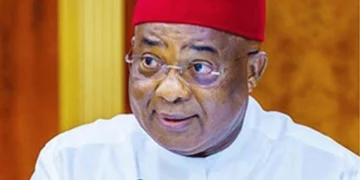Pan-Yoruba socio-cultural and socio-political organisation, Afenifere, has called on the federal government to be wary of advice from the World Bank in which it prescribed the reduction in government’s support for social services in Nigeria.
The senior vice president of the World Bank Group, Mr Indermit Gill, while speaking at a programme early this week in Abuja, referred to the withdrawal of support being provided by the government for social and economic programmes in Nigeria and the floating of the Naira, the country’s currency.
Gill who spoke at a three-day summit of the Nigerian Economic Summit Group (NESG) that started on Monday, October 14, said that the results of the current efforts would be seen in 10 to 15 years’ time.
Afenifere in a statement signed by its national publicity secretary, Comrade Jare Ajayi, urged the federal government to be wary of the advice.
It stated that the current administration under President Bola Tinubu would have run its terms before the 10 to 15 years the presumed dividends of the World Bank prescriptions would manifest.
Afenifere noted that Tinubu administration may then only be remembered for the sacrifices made by the people and the attendant sufferings while another administration would take the credit for the supposed dividends, if at all.
“So, rather than continuing with the bank’s policies, resort should be made to policies that boost local businesses and encourage local initiatives thus reducing dependence on imported goods,” the organisation said.
It added that the call on the president to be wary of the prescriptions by Bretton Woods’ institutions was predicated on what had happened to countries that followed various prescriptions made by either the World Bank or the International Monetary Fund (IMF) or both.
It recalled that most of the countries that heeded prescriptions or conditions that the two institutions always gave ended up in worse situations than the ones that made them run to either or both institutions.
Afenifere cited countries like Mexico, Mozambique, Ghana, Argentina, Thailand, South Korea, Indonesia, Democratic Republic of Congo, among others, who had headed the Bretton Woods institution’s advice.
It noted that Malaysia that was also an applicant along with the named countries dropped the idea because, according to its prime minister, Mahathir Mohammed, the conditions given by the Bank would hamper his people’s economic growth, force many businesses to close shop, raise unemployment and adversely affect people’s welfare thus engender hardships for the citizens.
“The conditions given by the Bank included budget cuts, removal of subsidies from some services being provided for the people and the devaluation of the country’s currency. But, instead of heeding the advice, the Malaysian PM did the exact opposite. Of course, it was tough initially. Today, however, Malaysia is growing economically and is one of the few countries that are shedding off the toga of third worldism.”











